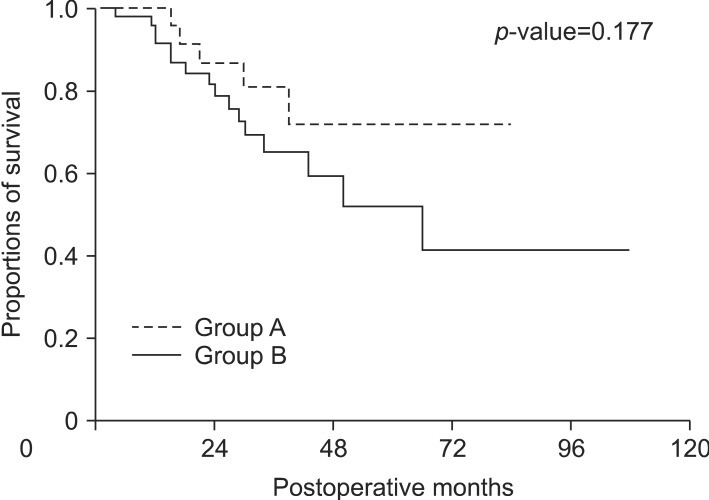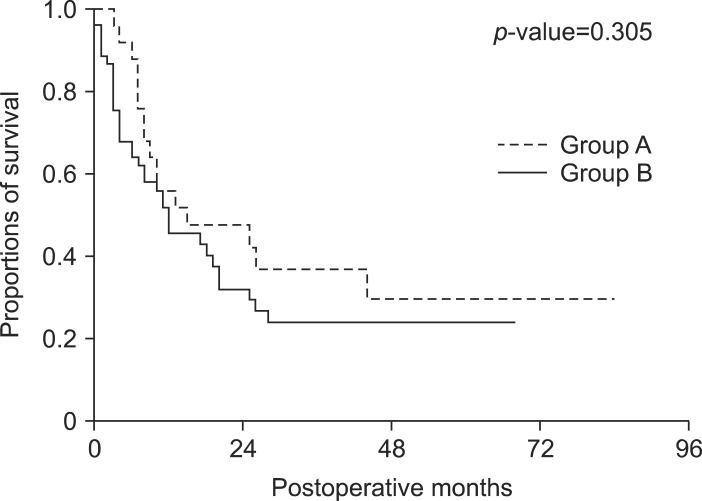Korean J Hepatobiliary Pancreat Surg.
2015 Aug;19(3):98-102. 10.14701/kjhbps.2015.19.3.98.
Hepatectomy, combined with intraoperative radiofrequency ablation in patients with multiple hepatocellular carcinomas
- Affiliations
-
- 1Department of Surgery, Korea Cancer Center Hospital, Korea Institute of Radiological & Medical Sciences, Seoul, Korea. gsceh@kcch.re.kr
- 2Department of Radiology, Korea Cancer Center Hospital, Korea Institute of Radiological & Medical Sciences, Seoul, Korea.
- 3Department of Surgery, Dongnam Institute of Radiological & Medical Sciences, Busan, Korea.
- KMID: 2043284
- DOI: http://doi.org/10.14701/kjhbps.2015.19.3.98
Abstract
- BACKGROUNDS/AIMS
We compared the efficacy and safety of a hepatectomy, combined with intraoperative radiofrequency ablation to those of wider extent hepatectomy, alone, in patients with multiple hepatocellular carcinomas (HCCs).
METHODS
Between January 2004 and December 2013, 78 patients with multiple HCCs underwent surgery. 25 patients were treated by hepatectomy, combined with intraoperative radiofrequency ablation (RFA) (group A), and 53 underwent hepatectomy only (group B). We retrospectively analyzed medical records to compare the clinical features of these two groups.
RESULTS
Patients in group A had more limited resections (less than 2 segments) than those in group B (p<0.001). Patients in group A also tended to have fewer red blood cell transfusions than those in group B (p=0.060). Liver function- and surgery-related complications occurred only in group B. There were no in-hospital mortalities in both groups. The overall survival and disease-free survival outcomes were not significantly different between groups A and B (p=0.177 and p=0.305, respectively).
CONCLUSIONS
Hepatectomy combined with intraoperative RFA could be a safe and effective treatment option for patients with multiple HCCs, comparable to extended hepatectomy alone.
MeSH Terms
Figure
Reference
-
1. Lee JM, Park JW, Choi BI. 2014 KLCSG-NCC Korea Practice Guidelines for the management of hepatocellular carcinoma: HCC diagnostic algorithm. Dig Dis. 2014; 32:764–777. PMID: 25376295.
Article2. Bruix J, Sherman M. American Association for the Study of Liver Diseases. Management of hepatocellular carcinoma: an update. Hepatology. 2011; 53:1020–1022. PMID: 21374666.
Article3. Kudo M, Matsui O, Izumi N, Iijima H, Kadoya M, Imai Y, et al. JSH consensus-based clinical practice guidelines for the management of hepatocellular carcinoma: 2014 update by the liver cancer study group of Japan. Liver Cancer. 2014; 3:458–468. PMID: 26280007.
Article4. European Association for Study of Liver. European Organisation for Research and Treatment of Cancer. EASL-EORTC clinical practice guidelines: management of hepatocellular carcinoma. Eur J Cancer. 2012; 48:599–641. PMID: 22424278.5. Bruix J, Llovet JM. Prognostic prediction and treatment strategy in hepatocellular carcinoma. Hepatology. 2002; 35:519–524. PMID: 11870363.
Article6. Cammà C, Schepis F, Orlando A, Albanese M, Shahied L, Trevisani F, et al. Transarterial chemoembolization for unresectable hepatocellular carcinoma: meta-analysis of randomized controlled trials. Radiology. 2002; 224:47–54. PMID: 12091661.
Article7. Llovet JM, Real MI, Montaña X, Planas R, Coll S, Aponte J, et al. Barcelona Liver Cancer Group. Arterial embolisation or chemoembolisation versus symptomatic treatment in patients with unresectable hepatocellular carcinoma: a randomised controlled trial. Lancet. 2002; 359:1734–1739. PMID: 12049862.
Article8. Llovet JM, Ricci S, Mazzaferro V, Hilgard P, Gane E, Blanc JF, et al. SHARP Investigators Study Group. Sorafenib in advanced hepatocellular carcinoma. N Engl J Med. 2008; 359:378–390. PMID: 18650514.
Article9. Ng KK, Vauthey JN, Pawlik TM, Lauwers GY, Regimbeau JM, Belghiti J, et al. International Cooperative Study Group on Hepatocellular Carcinoma. Is hepatic resection for large or multinodular hepatocellular carcinoma justified? Results from a multi-institutional database. Ann Surg Oncol. 2005; 12:364–373. PMID: 15915370.
Article10. Yin L, Li H, Li AJ, Lau WY, Pan ZY, Lai EC, et al. Partial hepatectomy vs. transcatheter arterial chemoembolization for resectable multiple hepatocellular carcinoma beyond Milan Criteria: a RCT. J Hepatol. 2014; 61:82–88. PMID: 24650695.
Article11. Feng K, Yan J, Li X, Xia F, Ma K, Wang S, et al. A randomized controlled trial of radiofrequency ablation and surgical resection in the treatment of small hepatocellular carcinoma. J Hepatol. 2012; 57:794–802. PMID: 22634125.
Article12. Cabibbo G, Maida M, Genco C, Alessi N, Peralta M, Butera G, et al. Survival of patients with hepatocellular carcinoma (HCC) treated by percutaneous radio-frequency ablation (RFA) is affected by complete radiological response. PLoS One. 2013; 8:e70016. PMID: 23922893.
Article13. Santambrogio R, Opocher E, Zuin M, Selmi C, Bertolini E, Costa M, et al. Surgical resection versus laparoscopic radiofrequency ablation in patients with hepatocellular carcinoma and Child-Pugh class a liver cirrhosis. Ann Surg Oncol. 2009; 16:3289–3298. PMID: 19727960.
Article14. Rhim H, Yoon KH, Lee JM, Cho Y, Cho JS, Kim SH, et al. Major complications after radio-frequency thermal ablation of hepatic tumors: spectrum of imaging findings. Radiographics. 2003; 23:123–134. PMID: 12533647.
Article15. Grieco A, Pompili M, Caminiti G, Miele L, Covino M, Alfei B, et al. Prognostic factors for survival in patients with early-intermediate hepatocellular carcinoma undergoing non-surgical therapy: comparison of Okuda, CLIP, and BCLC staging systems in a single Italian centre. Gut. 2005; 54:411–418. PMID: 15710992.
Article16. Kim YS, Lim HK, Rhim H, Lee MW, Choi D, Lee WJ, et al. Ten-year outcomes of percutaneous radiofrequency ablation as first-line therapy of early hepatocellular carcinoma: analysis of prognostic factors. J Hepatol. 2013; 58:89–97. PMID: 23023009.
Article
- Full Text Links
- Actions
-
Cited
- CITED
-
- Close
- Share
- Similar articles
-
- Combined Hepatic Resection and Intraoperative Radio-frequency Ablation for Multiple Hepatocellular Carcinoma
- Chemoembolization combined with radiofrequency ablation is the best option for the local treatment of early hepatocellular carcinoma?
- Radiofrequency Thermal Ablation of Hepatocellular Carcinomas
- Surgical resection versus ablation for early hepatocellular carcinoma: The debate is still open
- Current status and future of radiofrequency ablation for hepatocellular carcinoma



